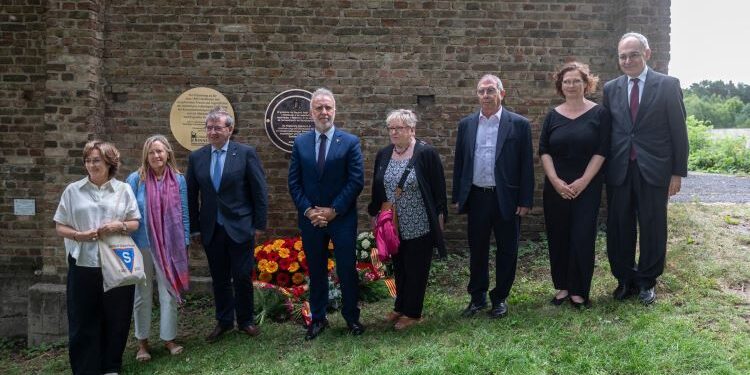The Diplomat
The Spanish Government paid tribute this Thursday in Germany to 120 Spanish women who were arrested and imprisoned in France for resistance activities against the Nazi occupation and deported to the Ravensbrück Nazi concentration camp. The ceremony, held at the camp’s memorial, was presided over by the Minister of Territorial Policy and Democratic Memory, Ángel Víctor Torres.
The Ravensbrück facilities were specifically designated for women and were located near the town of Fürstenberg, about 90 kilometers north of Berlin. They had a planned capacity for 4,000 people, but were soon overwhelmed and successive expansions were carried out. It is estimated that more than 132,000 prisoners passed through Ravensbrück, many of whom were accompanied by children and infants, of whom only 40,000 survived.
During his speech, Minister Torres remembered the 120 Spanish women of Ravensbrück. “Some of them, after fighting in Spain defending the Second Republic, crossed the Pyrenees to continue fighting fascism. This earned them the distinction of political prisoners, a red triangle that condemned them to systematic exploitation as forced labor,” he emphasized.
Torres recalled the terrible conditions these women suffered and emphasized the need to “honor them, remember them, and recover their memory.” “Last April 30th marked the 80th anniversary of the liberation of this camp. What better time to recognize the example of the lives of the 120 Spanish women who were imprisoned in this camp with a commemorative plaque.” The Spanish government’s “vocation,” he asserted, is “to recover the memory of the victims and honor the principles of truth, justice, reparation, and guarantees of non-repetition.”
Torres was accompanied by the Secretary of State for Democratic Memory, Fernando Martínez; Pascual Navarro, Spanish ambassador to Germany; Piedad Solans, representing Amical de Ravensbrück; and Concha Díaz, vice president of Amical de Mauthausen.
“Spain in Freedom. 50 Years” Exhibition
After the visit to the Ravensbrück Memorial, Minister Ángel Víctor Torres presided over the inauguration, at the Spanish Embassy in Germany, of the “Spain in Freedom. 50 Years” exhibition, which recognizes the role of the numerous social groups and institutions that made the Transition possible.
According to Torres, the exhibition explores the rights acquired in democracy, the social advances, and the consolidation of the system of freedoms over this half-century. “This fiftieth anniversary is not an exercise in nostalgia. It’s an exercise in conscience, in gratitude toward those who fought when it wasn’t easy, in pride in what we’ve achieved, and in responsibility for what still remains to be done,” he concluded.







